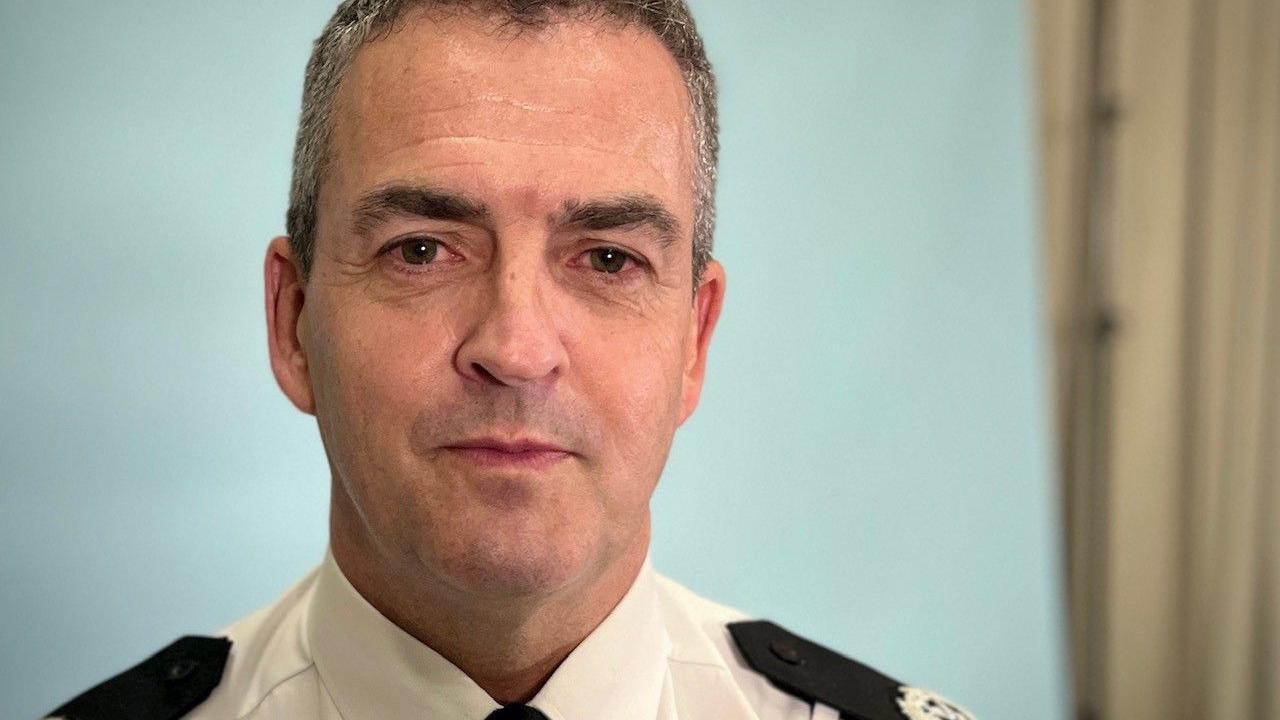Protest over evidence rules in sex crime cases
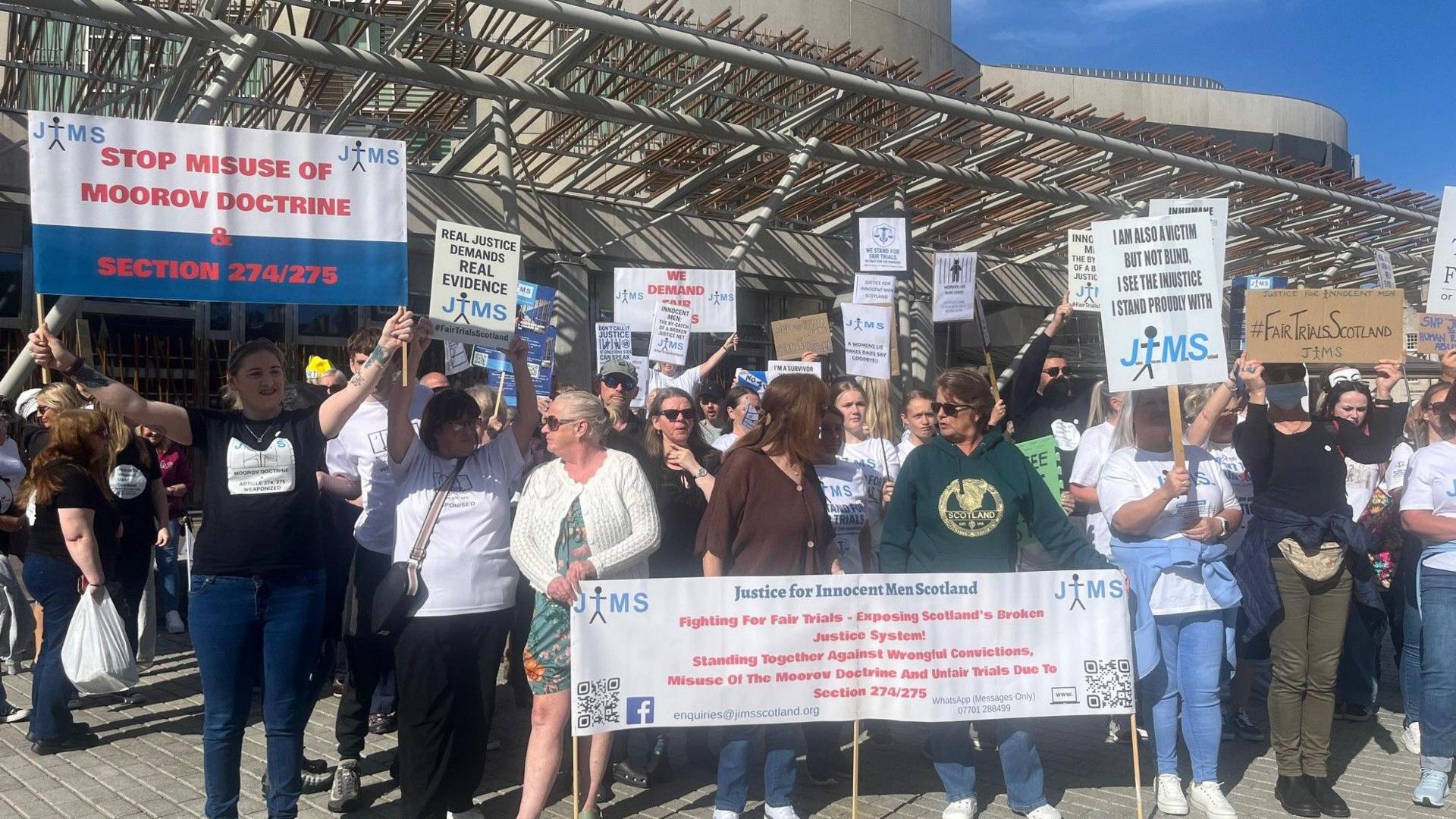
Supporters of the Justice for Innocent Men Scotland group staged a demonstration at Holyrood
- Published
A campaign group who claim men are being wrongly convicted of sex crimes has staged a protest outside the Scottish Parliament.
Justice for Innocent Men Scotland (Jims) says the rules on evidence in sex offence cases are resulting in unfair trials and miscarriages of justice.
About 200 of its members - including families of convicted sex offenders - gathered at Holyrood.
They were faced with a smaller counter-demonstration from a group called Justice for Every Mistreated Survivor (Jems) which says conviction rates for rape and sexual assault remain far lower than for other crimes.
The Jims group claims that men "can be convicted on nothing more than a story," that appeals are "near impossible" and "compensation schemes reward false allegations, incentivising lies".
However, some of its members have been accused of carrying out "vitriolic" online attacks against victims.
The Scottish government has said there are clear ways to challenge how evidence rules are applied.
At the protest outside Holyrood, Jims co-founder Kirsty McDermott said the courts were preventing important evidence being put before juries.
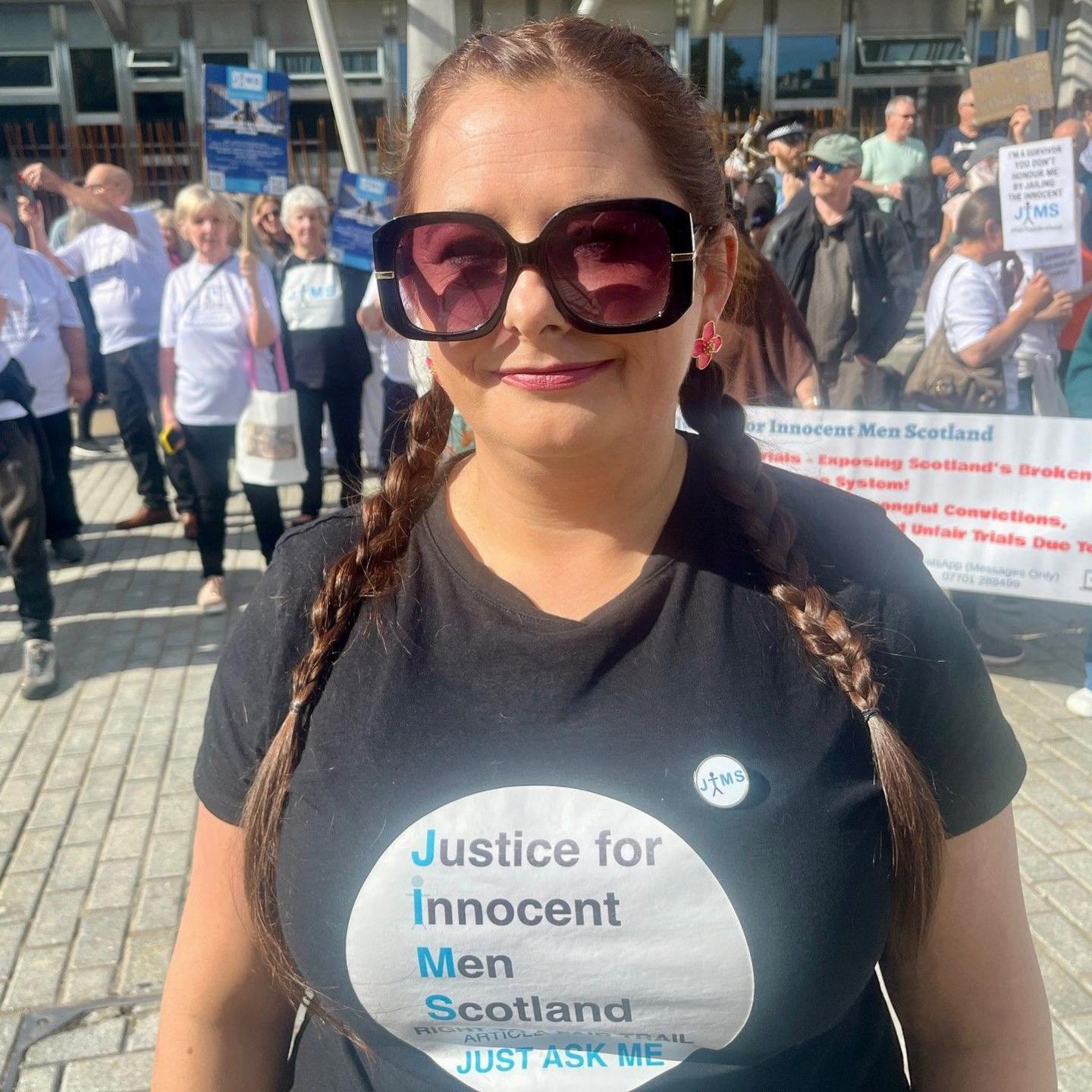
Kirsty McDermott believes many men are receiving unfair trials
"It's deemed as inadmissible. So this could be text messages, picture messages. This could be a witness that one of the accusers has maybe told a different story to," she said.
"If juries were aware of it, it could change the verdict they end up reaching on the day.
"We do understand that some of these laws were brought in with very, very good intentions, to stop victims being degraded in a courtroom, and they absolutely were needed.
"But the way they are being interpreted and certainly stretched at the moment, usually can result in men receiving unfair trials."
'We've been subjected to horrific insults'
One of those attending the Jems counter-protest was Ellie Wilson, a rape survivor who has waived her anonymity to push for changes in the conduct of sexual offence trials.
"We're here because there's an extremist group that have decided to show up, and this is a group that has targeted myself and other survivors and subjected us to horrific insults," she said.
"We believe that we need to show survivors that this sort of behaviour isn't acceptable and that we stand with them and we believe them."
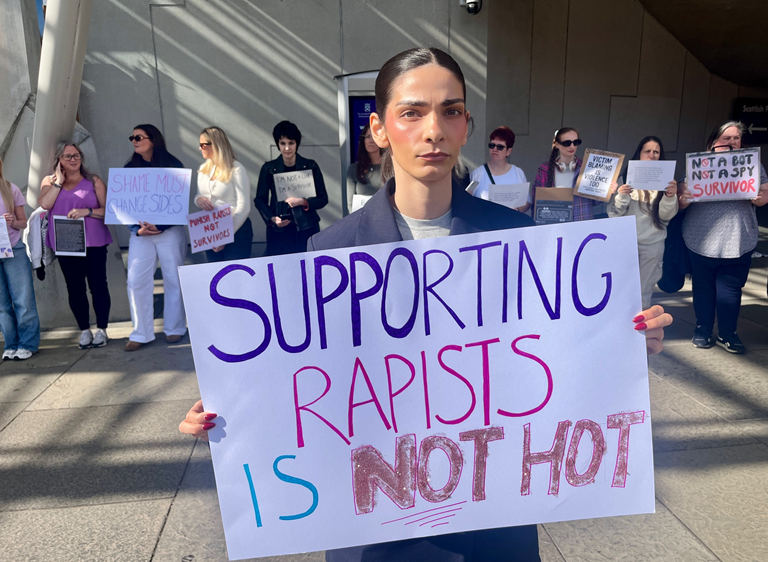
Campaigner Ellie Wilson denied the balance during trial had switched too far against the accused
She said trials were "traumatising ordeals" for victims.
"It's still extremely hard to get a conviction, so that shows that the balance hasn't shifted much.
"Convictions for sexual offences are still far lower than for any other crime type."
In response, Jims denied that the campaign had targeted survivors and said its members had been subjected to online abuse.
A Scottish government spokesperson said: "Everyone has the right to a fair trial and to appeal against a conviction or sentence.
"There are well-established rules on what evidence can be led in sexual offences trials, and clear routes to challenge how these are applied."
'They've earned the right to be believed'
Carolyn Quinn's ex-husband Kenneth Quinn was jailed for 15 years in 2024 for charges including rape and assault to severe injury.
She says Jims members have called her a "hardcore misandrist" after she appeared in a BBC documentary, Surviving Domestic Abuse, in March 2024.
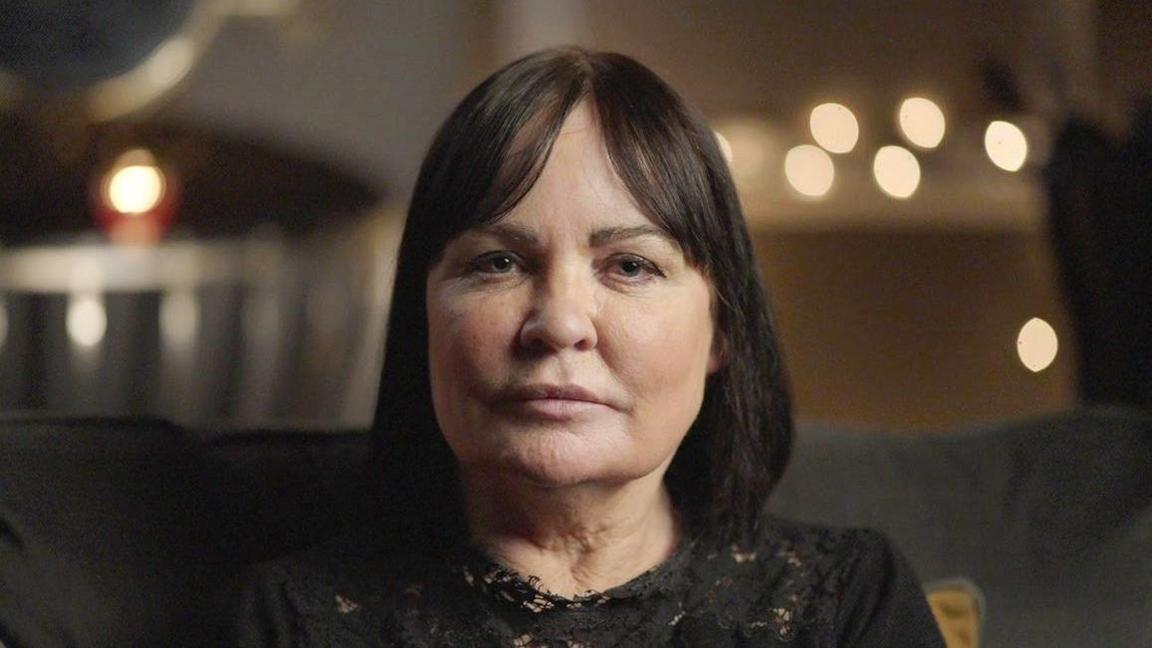
Carolyn Quinn says she has been targeted for online abuse by JIMS members who have "no regard" for victims
Carolyn said: "They've got no regard for victims and these victims, including myself, have suffered at the hands of violent offenders who have shown no mercy, no remorse, and they're still pleading their innocence.
"My case, including the rape charges, was based on witness statements, hospital records, medical evidence. It was before a judge and jury, and it included two years of extensive investigations."
Another victim who has spoken out against Jims was raped by a man who was sentenced to 17 years in prison.
She told BBC Scotland News: "It has halted any healing for me. The comments, the name-calling, the ridicule, the cartoons that they put up - I cannot believe it's legally allowed to happen.
"Anybody that's gone through the police investigation and who gets to court and gets a conviction should absolutely have earned the right to be believed."
In response, Jims denied that the campaign had targeted survivors and said its own members had been subjected to online abuse.
Kirsty McDermott said: "It's actually Jims and Jims members who have been the targets of threats and vile messages. One has resulted in a police investigation."
How has Scots law changed over sex offences?
Recent years have witnessed important changes to Scots law in response to long-standing concerns over the low conviction rate in rape and sexual offence cases.
Scotland's top law officer, Lord Advocate Dorothy Bain KC, has secured rulings which should result in more cases reaching court.
The direction of travel has not been without controversy, as shown last year when the UK Supreme Court considered two appeals by men convicted of sexual offences who claimed their human rights had been breached at their trials.
Both cases centred on sections 274 and 275 of the Criminal Procedure (Scotland) Act 1995.
Section 275 prevents the defence from using evidence which is designed to question a complainer's character or sexual history, unless an exception is granted under Section 275.
The Law Society of Scotland and the Faculty of Advocates told the Supreme Court: "The balance at the moment has not been struck fairly for the accused who is out at a distinct disadvantage in a trial when accused of a sexual offence."
They said measures to improve the experiences of complainers in sexual offence cases could not come at the price of "systematic unfairness" to the accused.
Rape Crisis Scotland said recent appeal court judgements have shown that the courts are taking "a tighter and more restrictive approach" to allowing such evidence in sexual offence trials.
It said the protections offered by Section 274 "really matter" for complainers who fear their sexual history or other aspects of their past being brought up in court.
The Supreme Court rejected one of the appeals but referred the case back to the appeal court in Scotland because of another issue. It is still to publish its judgement on the second.
- Published30 October 2024
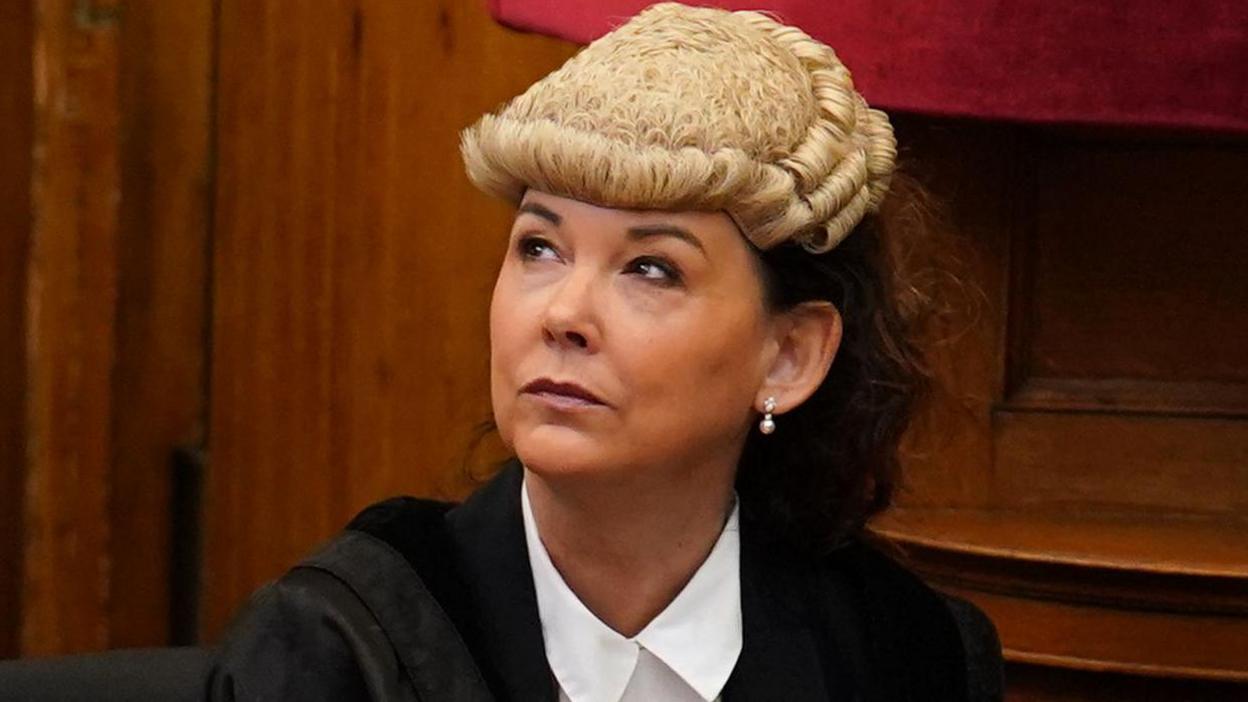
- Published28 October 2024
